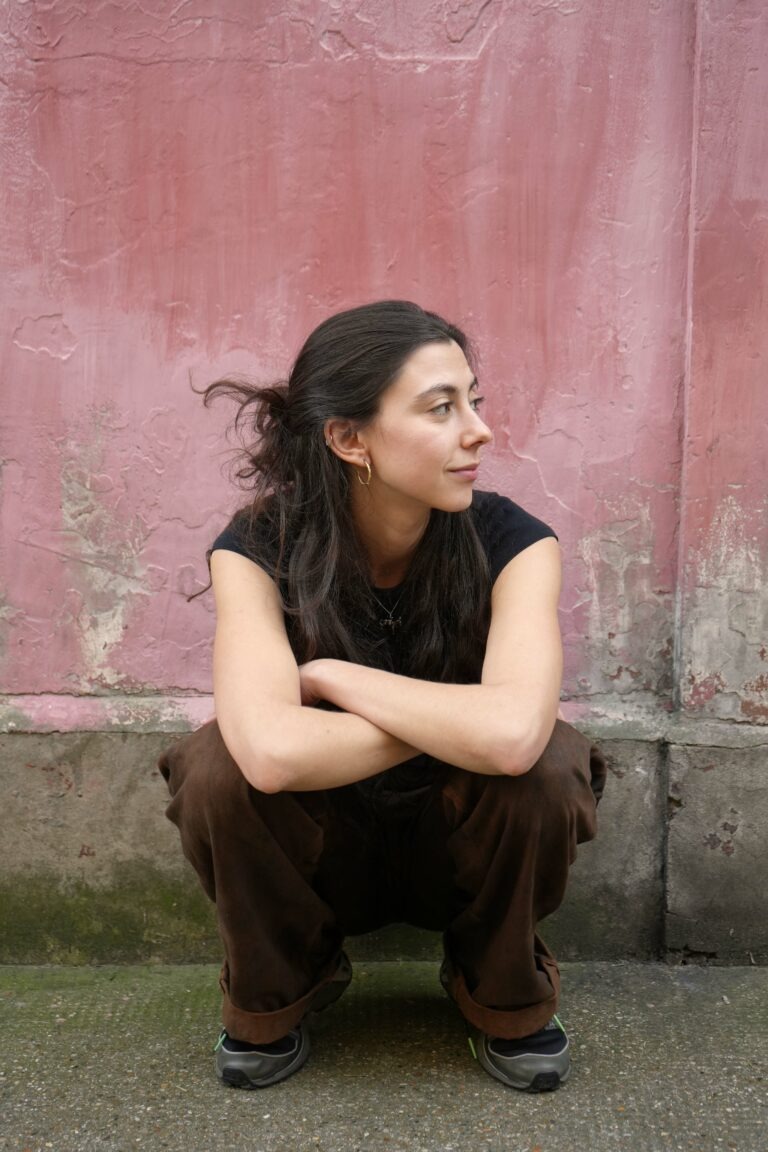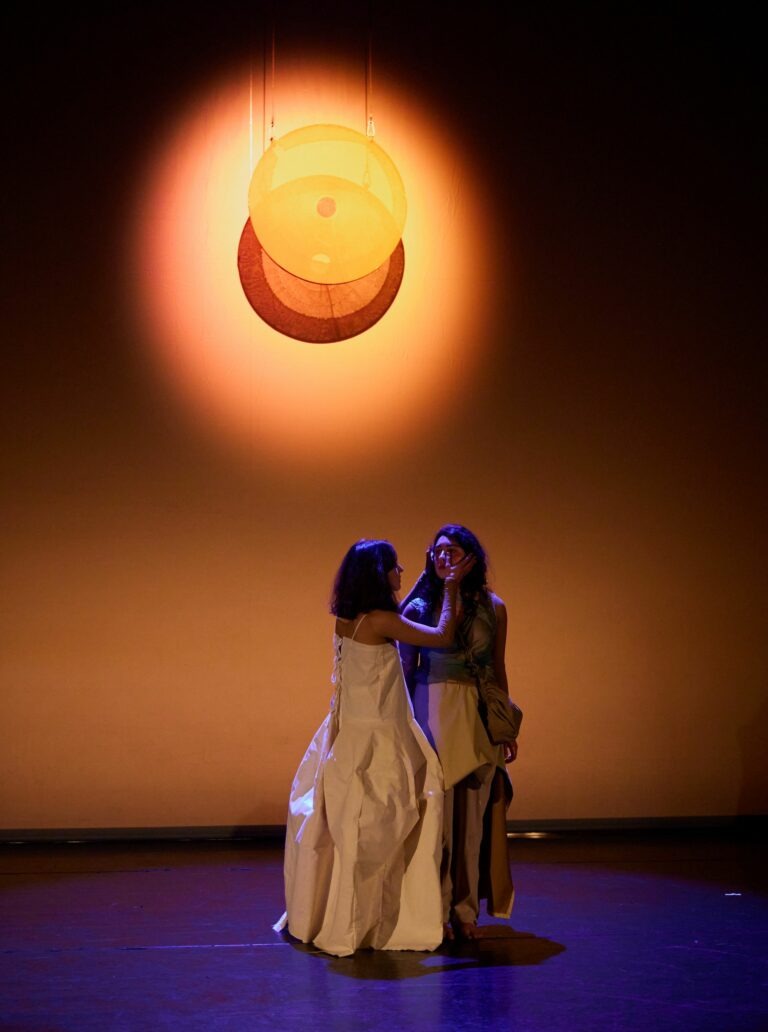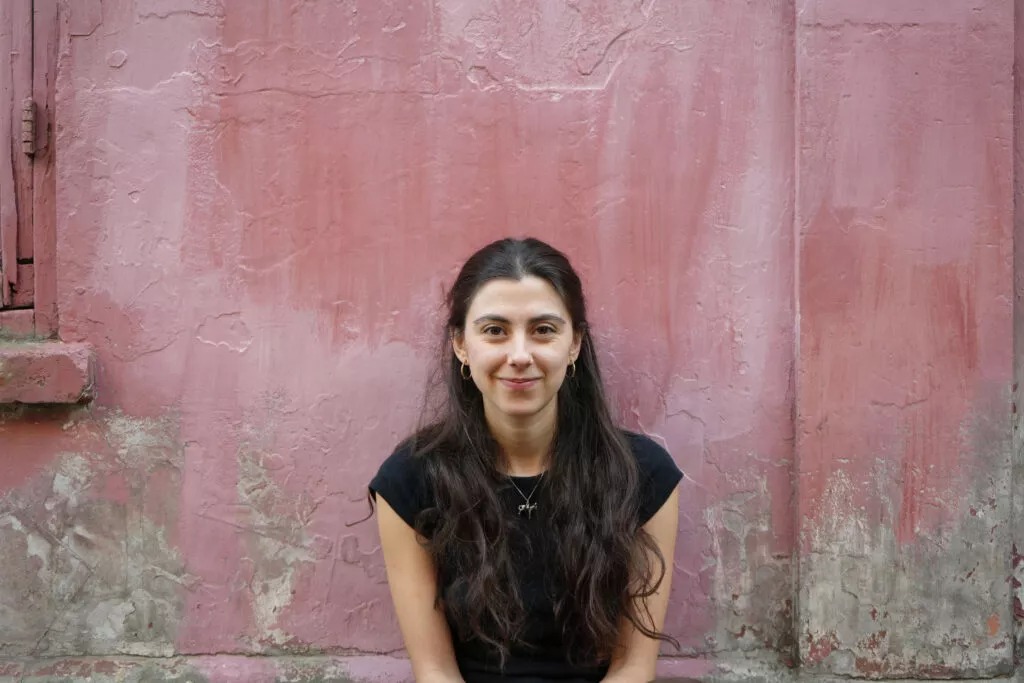Nefeli Kentoni realizes that the finest artists are careful listeners and observers of the world around them.
Raised in Cyprus within a deeply artistic environment, she now primarily operates in London in a multifaceted field. At only 25 years old, she has made a significant presence both on the island and internationally, expressing herself through theatrical and cinematic forms. Combining tenderness with absurdity, she enjoys deconstructing and reconstructing reality within unpredictable landscapes. The International Festival of Nicosia hosts her performance “KATABASIS” as part of the UNDER 30 section, featuring her own script and direction. She first presented it in 2022 at the Platform Theatre of Central Saint Martins in collaboration with an international ensemble of performers. It is a fantastical descent into the five rivers of Hades and a contemplation of human transience, with each narrative being an attempt to refute the predetermined “end.”
Why does the theme of human transience concern you at this stage of your life?
First of all the performance was created almost two years ago. Almost two years ago, my perception of the world was different, the same way that tomorrow my perception of a – seemingly same – world will be different again. I think it’s not that I’m interested in human transience in its brevity, but in its attempts, failures, and successes for transformation. That we are always in the process of becoming. Every narrative within Katabasis is an attempt to refuse petrification, to refuse a ‘telos’ already assigned. Not a refusal of death, but of a final ending, of a forever stagnation. There is no clear end point – not even in the theater – with its structured beginnings and endings. Because when Sarah Ruhl says that “every night when a curtain comes down, a world dies. The world of present relation dies, and one mourns the end by applauding”, then I question: what happens to the remains of this world? To its ruins? This world does not just disappear – it extends itself and finds little pockets within the audience to hide. At the end of every performance the audience is the sole survivor of an entire world that is no more. But the audience has been affected; somehow. The performance left its traces within them. So, it is the traces of human transiences that I am interested in. For now. We can talk about it again tomorrow.
What is your perennially favourite theme?
I don’t like this question, because it requires me to simplify my work. In the same way, I don’t like talking about my work in general, because it requires me to simplify it within a linguistic system which will never be enough to capture the essence of things. And I think this is something that is true for everything – not just art. We try to polish surfaces, put things into boxes, organize the world, in an attempt to understand it – and we don’t leave space for the mess. And the mess is important. Creation is messy. Being human is messy.
But, within this mess, it is true that I keep returning to five different binaries: Language/Image, Memory/Forgetting, Lightness/Heaviness, Performer/Audience, Presence/Absence [And for some reason there is always a mountain.]
And the truth is that I am not sure why these themes keep reappearing, but they always demand space in my work. It feels like we grow together.
I want to leave this extract from Maggie Nelson which changed the way I see myself and work in so many ways, in the hope that another person is touched by this.
“The pleasure of recognizing that one may have to undergo the same realizations, write the same notes in the margin, return to the same themes in one’s work, relearn the same emotional truths, write the same book over and over again–not because one is stupid or obstinate or incapable of change, but because such revisitations constitute a life.”

To what extent did your family environment influence your perspective on art?
Growing up me and my brother were exposed to a lot of art. I remember them taking us to museums and telling us “Look at all these artworks, it does not matter what you do; it can be bad or great, but this does not matter. Just make art”. And I think there is freedom in that. Although both a pressure and relief, it definitely demystified art for me.
They made me understand that it is not about inventing something new. Everything has been done and said. No more new ideas. We have enough. Our responsibility as artists is to expand what we have and make people feel that thing. That thing in our bodies, that only a few things can do. That thing, where your stomach tightens, and it feels as if all the muscles in your body travel there to hold it/to keep it inside you or else it might fall.
My parents, with all their talents and flaws, showed me that creation is a necessity, that you can make work out of nothing, that the conditions might never be ideal but we still need to show up and make work. Not because art can change the world – I don’t think it can – but because it makes you try to, and that sometimes is enough. Because how do we have the courage to continue being in a world rotten to the core, and still have the desire to change it, and remove some of its weight? Not in a naïve or romantic way, but in a practical one. Because not-to-be, sounds scarier than trying-to-be.
My parents, with all their talents and flaws, taught me that creation is a necessity, that you can make something out of nothing, and that conditions may never be ideal, but we must be there and create. Not because art can change the world -I don’t believe it can- but because it makes you strive to change it, and sometimes that’s enough. Because otherwise, how will we find the courage to continue to exist in a world rotten to the core and still maintain the desire to change it, to lighten the burden a little? Not in a naive or romantic way, but in a practical one. Because not being sounds scarier than trying to be.
How does a creator of your generation view the world and art?
I started creating in an effort to make sense of the world. Because this world is rough and unfair and heavy, and I cannot but feel the weight of our times paralyzing me some days, I cannot but question what is the point. So when I failed to understand this world, I started making my own. Because creation allows you to construct your own worlds. Allows you to become responsible for those worlds, and decide their weight, language, and colour. And I feel lucky that I can do that. [Should we not all be responsible for our world?].
What maintains the relationship between performer and audience?
That the two cannot exist without each other. They cannot exist as an actor and as an audience. Once separated, the actor has no purpose, has no one to act on. The audience cannot be acted upon. Their existence depends on each other’s role; on each other’s position: the stage, the auditorium. And this is a very big commitment. A commitment that was agreed on centuries before the actor’s existence, which dictates the actor’s existence. This commitment is a bond, an uneven one. Because while the actor is killing themselves on stage, the audience becomes witness to this death – observes this death from a safe distance. And yet the two cannot exist without each other.
Do you believe there are “passive” spectators?
As long as there are passive performances, there will be passive spectators.
Is imagination trainable?
Italo Calvino talks about the ethical utilization of literature to construct a visual “logico-fantastic machine” that rejects conventional images and trains readers to create their own. Within my work, I’m trying to do that. To put on stage things that are impossible to happen in the real world, for the audience to see the world differently, to expand their imagination. Because we build worlds out of what we see, not out of what is possible. So, I hope that with my work one can see that a different world is possible.
Is generosity and communication with others a prerequisite for art?
Definitely!
As a writer and director, my work relies on this generosity, on so many levels and within so many spaces; the paper, the rehearsal space, the stage.
On paper:
When writing, my texts become a collage of everything I read and saw. My words confront a bibliography of ideas that began even before I was born. Sometimes they fight each other. Sometimes they make you feel small. Other times they become one, and only few can decipher the words of Heiner Müller, Italo Calvino, Clarice Lispector, Sarah Ruhl, Maggie Nelson etc. The ‘my’ and the ‘theirs’ gets lost somewhere on the page, to become ours. And then our words, stop being our words.
In Rehearsal Space:
And become the actor’s, composer’s, costume designer’s words. I trust them with my words and vision, and they generously and with such sensitivity add their own self/flesh and own long bibliography. During rehearsals, my recurring collaborators offer things I would have never imagined on my own. Together we have created a common language of movement, aesthetic, and trust and my work would not have been the same without them. It is their generosity that gives flesh to my work/words.
On Stage:
But once on stage, the actor’s words become the audience’s. And the performance finishes, and maybe the audience takes those words, and places them on another page, for this cycle of generosity to continue. No longer an endpoint, the artwork returns again and again, to renegotiate its past and future, its references and stimulus, its reasons for existing
It is this generosity, that regardless of how big the ego, because there is always ego, you find yourself humbled and free to continue making work.
INFO “KATABASIS,” 9/2 Municipal Theatre of Nicosia, 8:30 p.m. Sold Out Tickets







